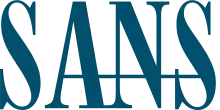SANS Institute
The SANS Institute (officially the Escal Institute of Advanced Technologies) is a private U.S. for-profit company[1] founded in 1989 that specializes in information security, cybersecurity training, and selling certificates. Topics available for training include cyber and network defenses, penetration testing, incident response, digital forensics, and auditing.[2] The information security courses are developed through a consensus process involving administrators, security managers, and information security professionals. The courses cover security fundamentals and technical aspects of information security. The institute has been recognized for its training programs[3] and certification programs.[4] Per 2021, SANS is the world’s largest cybersecurity research and training organization.[5] SANS is an acronym for SysAdmin, Audit, Network, and Security.[6]
 | |
| Abbreviation | SANS |
|---|---|
| Formation | 1989 |
| Location |
|
| Website | |
Programs
The SANS Institute sponsors the Internet Storm Center, an internet monitoring system staffed by a community of security practitioners, and the SANS Reading Room, a research archive of information security policy and research documents. SANS is one of the founding organizations of the Center for Internet Security.
SANS offers news and analysis through Twitter feeds and e-mail newsletters. Additionally, there is a weekly news and vulnerability digest available to subscribers.[7]
Training
When originally organized in 1989,[8] SANS training events functioned like traditional technical conferences showcasing technical presentations. By the mid-1990s, SANS offered events which combined training with tradeshows. Beginning in 2006, SANS offered asynchronous online training (SANS OnDemand) and a virtual, synchronous classroom format (SANS vLive). Free webcasts and email newsletters (@Risk, Newsbites, Ouch!) have been developed in conjunction with security vendors. The actual content behind SANS training courses and training events remains "vendor-agnostic". Vendors cannot pay to offer their own official SANS course, although they can teach a SANS "hosted" event via sponsorship.
In 1999, the SANS Institute formed Global Information Assurance Certification (GIAC), an independent entity that grants certifications in information security topics.[9]
It has developed and operates NetWars, a suite of interactive learning tools for simulating scenarios such as cyberattacks. NetWars is in use by the US Air Force[10] and the US Army.[11][12]
Faculty
The majority of SANS faculty are not SANS employees, but industry professionals and experts in the field of information security.[13][14] The faculty is organized into six different levels: Mentors, Community, Certified Instructors, Principal Instructors, Senior Instructors, and Fellows.[15]
SANS Technology Institute
As of 2006, SANS established the SANS Technology Institute, an accredited college based on SANS training and GIAC certifications. On November 21, 2013, SANS Technology Institute was granted regional accreditation by the Middle States Commission on Higher Education.[16]
SANS Technology Institute focuses exclusively on cybersecurity, offering a Master of Science degree program in Information Security Engineering (MSISE), five post-baccalaureate certificate programs (Penetration Testing & Ethical Hacking, Incident Response, Industrial Control Systems, Cyber Defense Operations, and Cybersecurity Engineering (Core), and an upper-division undergraduate certificate program (Applied Cybersecurity).
SANS continues to offer free security content via the SANS Technology Institute Leadership Lab[17] and IT/Security related leadership information.[18]
References
- "What is the SANS Institute?". SANS Frequently Asked Questions (faq): Security Training: General. Retrieved 2012-09-19.
- "The SANS Institute Company Profile - Office Locations, Competitors, Revenue, Financials, Employees, Key People, Subsidiaries". crafit.io.
- "SC Magazine Awards 2015" (PDF). SC Magazine. Archived from the original (PDF) on 2018-08-07. Retrieved 2015-11-17.
- "2014 SC Awards U.S. Winners". SC Magazine. Retrieved 2015-11-17.
- Perlroth, Nicole (2021-11-15). "Alan Paller, a Mover on Cybersecurity Threat, Is Dead at 76". The New York Times. Retrieved 2022-03-19.
- "SANS Definition from PC Magazine Encyclopedia". www.pcmag.com. Retrieved 2016-09-14.
- Messier, Ric (2014). GSEC: GIAC Security Essentials Certification. New York: McGraw-Hill Education. p. 7. ISBN 978-0-07-181962-6.
- "SANS Institute: About". sans.org. Archived from the original on 2013-04-12. Retrieved 2008-12-16.
- "GIAC Information Security Certifications – Cyber Certifications". giac.org.
- "Stepped Up Cyberthreats Prompt Air Force To Rethink Training, Acquisitions". Afcea International. Retrieved 2015-11-17.
- "Strengthening the nation's defense against hackers". www.cbsnews.com. 26 April 2015. Retrieved 2015-11-17.
- O'Harrow, Robert Jr (2012-11-26). "CyberCity allows government hackers to train for attacks". The Washington Post. ISSN 0190-8286. Retrieved 2015-11-17.
- Cyber Security Minute (15 February 2017). "Instructor Expertise".
- PacketStan. "What I Learned At Camp".
- SANS Technology Institute. "Instructors".
- "SANS Technology Institute, The - Statement of Accreditation Status". Middle States Commission on Higher Education. Retrieved 2022-03-19.
- "STI Information Security Laboratory". sans.edu. Archived from the original on 2010-12-20. Retrieved 2007-07-14.
- "STI Information Security Leadership Laboratory". sans.edu. Archived from the original on 2010-12-16. Retrieved 2007-05-10.